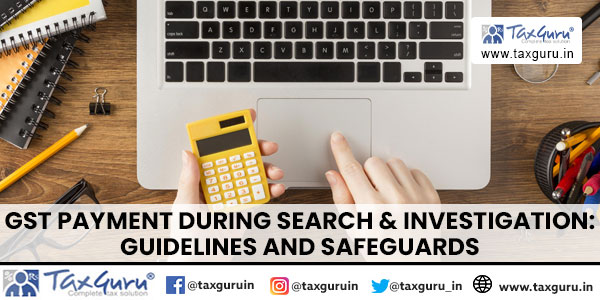In the recent times, it has been seen that the GST officers often asking the assessee to make the payment of tax during search/ inspection proceedings under sec 67 of the CGST Act by using threat and coercion. However, it is to be noted that there are no provisions under GST Law for advance payment of GST unless self-ascertained and accepted by the taxpayers and no recovery can be done by the department without following proper adjudication process under sec 73/74 of the CGST Act
Safeguards to Taxpayers under GST:
Department has issued even clarification regarding safeguards to taxpayers in respect of Search or Seizure.
Certain safeguards are provided in sec 67 of CGST/SGST Act in respect of the power of search or seizure These are as follows:
a) Seized goods or documents should not be retained beyond the period necessary for their examination;
b) Photocopies of the documents can be taken by the person from whose custody documents are seized;
c) For seized goods, if a notice is not issued within six months of its seizure, goods shall be returned to the person from whose possession it was seized. This period of six months can be extended on justified grounds up to a further period of maximum six months;
d) An inventory of seized goods shall be made by the seizing officer;

e) Certain categories of goods to be specified under CGST Rules (such as perishable, hazardous etc.) can be disposed of immediately after seizure,
f) Provisions of Code of Criminal Procedure 1973 relating to search and seizure shall apply. However, one important modification is in relation to sub-section (5) of sec 165 of Code of Criminal Procedure – instead of sending copies of any record made in course of search to the nearest Magistrate empowered to take cognizance of the offence, it has to be sent to the Principal Commissioner/ Commissioner of CGST/ Commissioner of SGST.
There are multiple judgements where Court from time to time confirmed that, there should be not any harassment / pressure on taxpayer for duty payment in course of search & inspection. I have noted down some of the important judgements.
- No cheques to be collected from assessee until tax demand is confirmed
The practice of collecting post-dated cheques under coercion during raid is not permissible means of collection of revenue particularly, when no tax demand has been confirmed or crystallized. Held that, the action of the revenue department cannot be countenanced with a direction to return the cheques to the assessee – Gujarat HC in Remark Flour Mills Pvt. Ltd. v. State of Gujarat [Special Civil Application No. 4835 of 2018 dated 19.04.2018]
- No recovery of tax to be made during search, inspection or investigation unless it is voluntary
The payment of tax made during the conduct of search cannot be considered as voluntary payment of tax. If a procedure is prescribed under a statute or by law, that is, via dicta contained in a judgment, it has to be followed. Further, failure to follow the prescribed procedure will conclude that the deposit of tax, interest and penalty was not voluntary – Delhi HC in M/s. Vallabh Textiles v. Senior Intelligence Officer and Ors [W.P.(C) No. 9834/2022 dated 20.12.2022]
- Payment made during investigation is not to be considered as ascertained tax
Swiggy’s payment made as goodwill gesture during investigation cannot be taken as self- ascertained tax. Further, the directed the Department to refund money deposited during the investigation – Karnataka HC in M/s Bundl Technologies Private Limited v. Union of India [WP 4467/2021 (T-RES) dated 14.09.2021-appeal filed dismissed [W.A. No. 1274 of 2021 (T-RES) in W.P.No. 4467 of 2021 (T-RES) dated 03.03.2022]
- Allowed refund of the amount deposited by assessee under coercion without issuance of SCN or demand order at the time of payment
Set aside the order attaching the bank account of the assessee on the ground that, amount had been deposited by assessee under coercion, which as per the revenue department was deposited voluntarily, whereas, neither any demand nor SCN was pending at that time. Held that, a person whose property has been provisionally attached can file objections and if the written order is not communicated to him, he would not be in a position to know the reasons to arrive at the conclusion that it was in the interest of the Revenue to attach the property. Further, directed the Revenue Department to refund the amount after retaining 10% of the duty demanded – Punjab & Haryana HC in Himanshu Infraprojects Pvt. Ltd. v. Commissioner, CGST [CWP No. 11407 of 2020 (O&M) dated 18.01.2021].
- No coercive steps for recovery without following adjudication process
The department asked the petitioner INR 2,69,21,228/- being alleged as inadmissible input tax credit and file DRC-03 challan without initiating any adjudication process either under sec 73 or sec 74. The Court held that no coercive steps shall be taken for recovery of the said demand without following the adjudication process – Delhi HC in Rishi Bansal v. Union of India [WP (C) No. 4409 of 2020 dated 22.07.2020]
- After statement is retracted, burden of proof is on prosecution to prove statement was voluntary
Once retraction of a confessional statement takes place, burden to prove that statement was voluntary is on prosecution to prove that the confession is voluntarily in nature and not obtained as an outcome of threat, etc. if the same is to be relied upon solely for the purpose of securing a conviction – Hon’ble SC in Vinod Solanki v. Union of India [2009 (233) E.L.T. 157 (S.C.)]
- No GST to be paid during search & seizure unless accepted as GST liability
Merely because the assessee had signed a statement admitting tax liability under the stress of investigation and had also made a few payments as per the statement, cannot lead to self- assessment or self-ascertainment. The ascertainment contemplated under sec 74(5) of the CGST Act is of the nature of self-assessment and amounts to a determination by it which is unconditional, and not one that is retracted. Thus, the understanding and application of sec 74(5) of the CGST Act is wholly misconceived. Further directed the Revenue Department, to refund the amount of INR 2 crore collected from the assessee during the investigation Madras HC in Shri Nandhi Dhall Mills India Pvt. Ltd. v. Senior Intelligence Officer, DGGST & Ors. [W.P. No. 5192 of 2020 and WMP. No. 6135 of 2020 dated 07.04.2021]
However, in the above-mentioned matter, an appeal was filed before the Madras HC by the Revenue Department, on the grounds that an enquiry has to be conducted and the actual tax liability has to be determined. Subsequently, the court directed the Revenue Department to issue an SCN calling upon the assessee to produce documents to prove that they are not liable to pay any tax or they have paid the entire tax due, afford an opportunity of personal hearing to the assessee and thereafter pass appropriate orders on merits after determining the amount of tax and entitlement of refund of the sum already paid by the assessee.
Further, directed the assessee to submit their objections, along with documentary evidence and to appear for personal hearing and make their submissions – Senior Intelligence Officer, DGGI v. Shri Nandhi Dhall Mills India Pvt. Ltd. [Writ Appeal No. 1441 of 2021 And C.M.P. No. 8962 of 2021 dated 23.02.2022]
- Issued directions that no recovery should be during search/inspection under any circumstances
The Court passed an interim order directing the CBIC and Chief Commissioner of Central/State Tax to issue guidelines by way of suitable circular/instructions stating that:
- No recovery in any mode by cheque, cash, e-payment or adjustment of ITC should be made at time of search/inspection proceedings under sec 67 of the CGST Act;
- If the assessee comes forward to make voluntary payment by filing Form DRC-03, the assessee should be asked/advised to file such Form DRC-03 on the next day after the end of search proceedings and after the officers of the visiting team have left the premises of the assessee;
- Facility of filing complaint/grievance after the end of search proceedings should be made available to the assessee if the assessee was forced to make payment in any mode during the pendency of the search proceedings;
- If complaint/grievance is filed by assessee and officer is found to have acted in defiance of the afore-stated directions, then strict disciplinary action should be initiated against the concerned officer – Gujarat HC in Bhumi Associate v. Union of India [R/Special Civil Application Nos. 2426, 2515, 2618 and 3196 of 2021 dated 16.02.2021]
The power of search and seizure are stringent powers and must be exercised strictly in terms of the statute and only if the necessary conditions are satisfied.
Moreover, the CBIC had also issued instruction no. 1/2022-23 (GST-Investigation) dated 25.05.2022, w.r.t. deposit of tax during the course of search, inspection or investigation wherein, it has been clarified that, there may not be any circumstance necessitating ‘recovery’ of tax dues during the course of search or inspection or investigation proceedings, to specifically state that, no recovery of tax is to be made by the GST Authorities during search, inspection or investigation under any circumstances, unless it is voluntary. Such instruction has been issued due to alleged use of force and coercion by the GST officer for making ‘recovery’ and for getting the amount deposited during search or inspection or investigation.
It is important to mention that sec 74(5) of the CGST Act uses the term ‘own ascertainment’. It means only those situations are enveloped in sec 74(5) in which the assessee accepts the tax liability without reservations. Thus, if the assessee withdraws his/her earlier statement and says that he/she has accepted the liability during search and seizure due to the stress of the investigation or to get rid of coercion and threat, sec 74(5) of the CGST Act cannot be invoked.
Sec 74(5) is not a statutory sanctioning to collect tax along with interest and penalty during search and seizure except being unconditionally self-ascertained. In the case of Anand Brothers, the department had to demand a tax amount along with interest and penalty under fraud cases for which consent had to be taken from the assessee through the issue of SCN under sec 74(1). Therefore, no amount can be collected by the revenue department during the inspection/search in the influence of coercion, threats, and panic unless self-ascertainment/accepted by the assessee.





